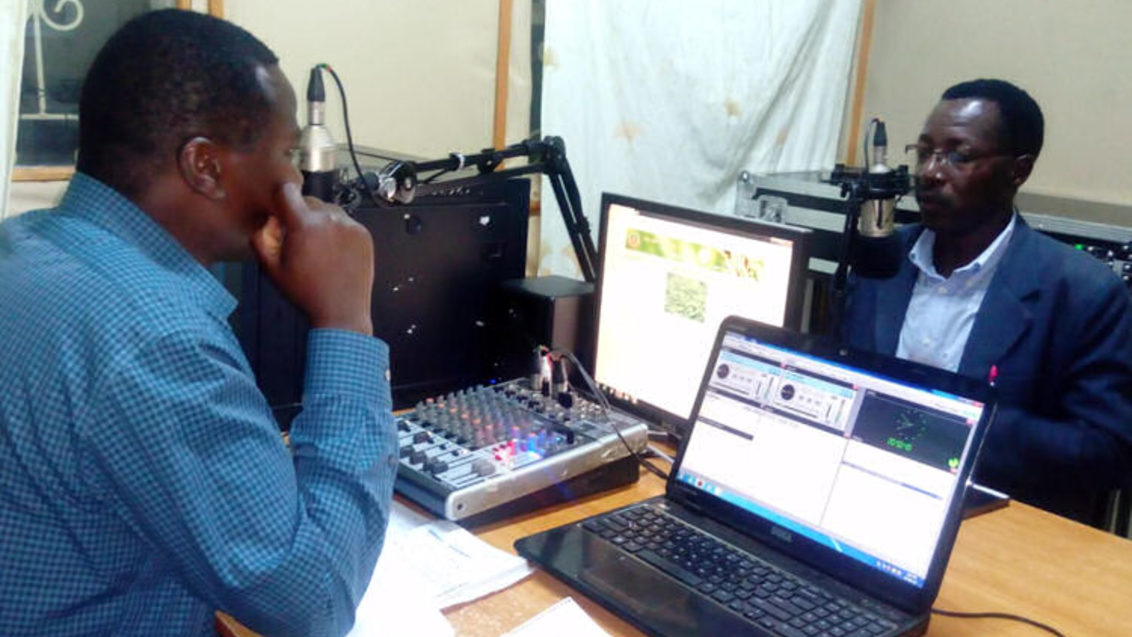An audible extension to the voices of farming

Radio is an excellent tool for agricultural extension: respected, widely accessible, democratic and top value for money. Radio extension in farmers’ local languages increases their acceptance of the messages, and thus their adoption of new practices. It may also help raise the status of minority tongues in the eyes of the young, because “grandmother’s language” becomes associated with a professional benefit. For county extension officers in Kenya, radio also hugely expands their reach in remote areas.
That’s the thinking behind our work with local stations there.
As you’ll see on our Radio Extension page, our first group of stations is now well launched after three years. In 2018, we’ve started with a new group, mainly in other parts of the country. You’ll see which those are on the page just mentioned. Typically, small radio stations of this type have so far provided no or only a little information for farmers. These, however, are often the great majority of their listeners!
Our implementation partner Kilimo Media International (KiMI) recently held the initial training course for 20 radio producers and extension officers. This took place at Wambugu Agricultural Training Center in Nyeri County.
“Our three-day course introduced everyone to the use of radio for agriculture extension”, reports KiMI Director Pamela Mburia. “We worked on a variety of program formats, scripting, editing, and how to interview farmers in the field or other experts in the studio. There were also presentations on climate change, gender and smallholders’ challenges, and opportunities.” Participants additionally profited from hearing first-hand from an extension officer who works very successfully with a station in our first group.
Practical training is essential
In true KiMI style, however, this wasn’t just about theory. “We put great emphasis on practical experience”, says coach Toepista Nabusoba. “So we paired up course participants into production teams for their county. Together, we helped them develop 13-week programming schedules to match the local agricultural calendar.”
The workshop ended with real-life production of a “buffet”. This magazine-style program included a guest interview, short drama and agricultural tip. The buffet aired from 8 to 9 p.m. on Rware FM. The studio guest was the farm manager at the Wambugu training center’s farm, Moses Gichohi (right in our photo). Rware FM interviewed him on the services that smallholders can access from the farm.
“I’m delighted to say that even this pilot transmission stimulated calls and text messages from listeners”, smiles Pamela Mburia. “Our aim with such programs is always to get the audience actively involved, and linked up with the extension officer.”
Course participants said they felt well prepared to stage similar programs in their areas. But KiMI’s work continues. “It’s really important that we stay in close touch with the stations”, Toepista Nabusoba knows. She and Pamela have already visited all five new stations, and will soon do so again.
With flooding in much of Kenya, these trips were far from easy. But they are worth all the effort. “The visits enable us to answer stations’ questions, train new personnel, follow up on reporting, and help establish farmer listener groups.” Such groups are very important for anchoring the radio advice in the community, improving agricultural practices and enabling farmers to take up new income-raising opportunities.
The recent heavy rains also make life difficult for extension officers and station producers trying to reach farmers. The Kajiado region extension officer also had to miss one of the studio sessions. Apart from that, however, and some changes at station level, the second round of our three-year initiative is off to an audibly strong start.
